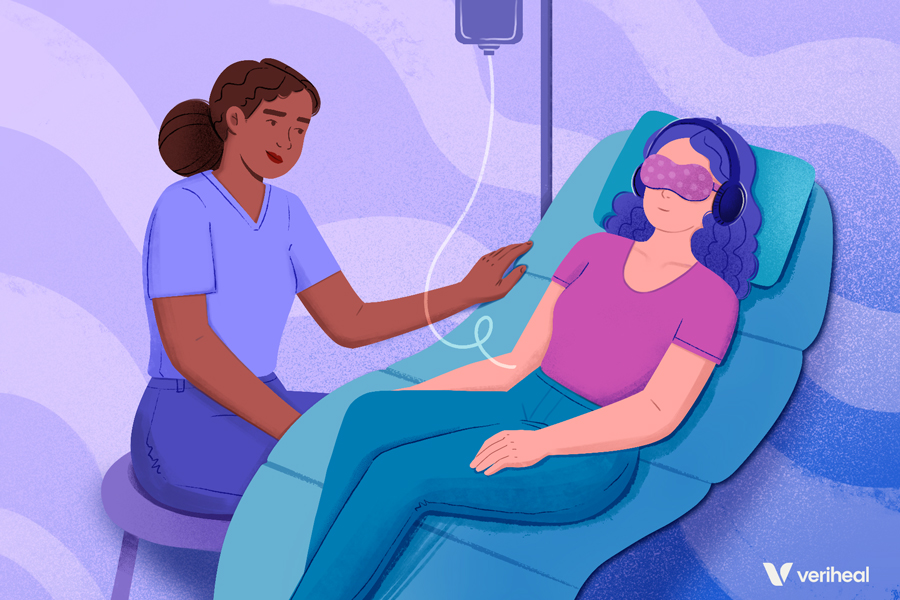What was once used as an ideal anesthetic for monkeys could soon be competing with cannabis as a medical aid. We’re talking about ketamine—a dissociative anesthetic that is featured on the World Health Organization’s List of Essential Medicines. Also known as “K,” “special K,” or “cat-valium,” ketamine is gradually climbing out of an abyss of K-fueled house parties and into the vortex of medicine.
This powerful anesthetic may offer swift symptomatic relief from the symptoms of widespread mental health conditions, including anxiety, bipolar disorder, treatment-resistant depression/major depression, PTSD (post-traumatic stress disorder), OCD (obsessive-compulsive disorder), and various addictions/substance use disorders.
Globally, the ketamine market was worth USD $132.43 million in 2021 and is expected to grow at a compound annual growth rate (CAGR) of 75.52% to $3871.44 million by 2027. Psychiatrists are even pushing for ketamine insurance coverage. Currently, the only ketamine treatment for depression that insurance will cover is esketamine (Spravato), an FDA-approved nasal spray.
With more than 300 million people fighting depressive episodes on a regular basis, the need for effective treatment is immense. Ketamine serves as an aid for mental illness, pain relief, and as a meditative tool. The substance’s versatility cannot be ignored, but how exactly does it fare against cannabis?
The Differences Between Cannabis and Ketamine
Cannabis and ketamine are two substances that purportedly harbor medicinal effects, including anti-depressive qualities. However, the two substances look very different—cannabis is a Schedule I leafy green plant cloaked in trichomes, whereas ketamine is a Schedule III clear liquidized substance (or white powder if it is cooked) that is created using ingredients like Ketamine hydrochloride, silica gel, Stevia, acacia, citric acid, flavor, and polyethylene glycol 1450.
Aside from their differences in appearance, these substances also differ in terms of how they release their effects. Ketamine works differently than traditionally prescribed antidepressant medications, which normally influence serotonin levels (much like tetrahydrocannabinol (THC) does) or other neurotransmitters in the brain. Rather, ketamine reacts with glutamate, a neurotransmitter that prompts communication between brain cells.
If there’s anything that these two substances do have in common, however, it’s that they have both been painted black due to their skewed reputations. Just as cannabis is reemerging from its “stoner stereotype” past as a newfound pharmaceutical plant with multiple medical benefits, ketamine is also garnering glory for its therapeutic benefits.
Why You Should Get Your Medical Marijuana Card
Veriheal has satisfied millions of patients nationwide by giving them access to these benefits
- Larger purchase limits
- Peace of mind
- Enhanced legal protection
- Access to higher potency strains
- Save up to 25% on cannabis purchases
- Skip the line at the dispensary
Ketamine Clinics Are an Evolutionary Addition to U.S. Healthcare
Ketamine therapy has delivered positive results for patients when used in a structured outpatient setting. In Manhattan alone, 12 clinics have already opened their doors. Many clinics are capitalizing on an opportunity to use ketamine therapy as a treatment for alcoholism, among many other things.
With the research stacking up, there’s no wonder why. A new study published in Psychiatry Research found that ketamine acts as a promising tool for treating depression in patients with bipolar disorder. Four doses of intravenous ketamine (0.5-0.75mg/kg over 40 minutes) were administered to 100 patients over two weeks.
Outcomes were measured using the Quick Inventory of Depressive Symptomatology–Self Report 16-item and Borderline Symptom List 23-item. Researchers found that patients “exhibited a significant reduction in symptoms of depression, borderline personality, suicidality, and anxiety.”
Another recent study published in the journal Critical Care Medicine discovered that the medicine could relieve the symptoms of traumatic brain injury in children. What’s more, research has shown that ketamine, which may induce a sense of disassociation and disembodiment, does not depress breathing or reduce blood pressure.
Ketamine Product Diversity Is Luring in Consumers
More medicinal-focused ketamine research is set to take place in the foreseeable future, with the Food and Drug Administration (FDA) recently approving clinical trials for R-ketamine—”a rapid onset and sustained antidepressant without psychotomimetic side effects.”
When used recreationally as a party drug, ketamine is normally snorted in the form of a crystallized powder. Conversely, when used under the supervision of a trained healthcare provider, ketamine is usually administered in the form of intravenous (IV) infusions. Other methods of administration include sublingual lozenges and nasal sprays.
Why Cannabis Is the Better Option
While we still have more to learn about both cannabis and ketamine before the two substances can really be compared, it’s likely that cannabis is the safest option so far. Aside from the fact that cannabis is an all-natural plant, it is also incredibly versatile and has undergone more intense research than ketamine has done.
Nonetheless, illegally-bought cannabis may contain heavy metals, fungi, and pesticides, which is why it is important to buy lab-tested products from a reliable supplier. Regardless of which road you go down to treat mental health disorders or another type of medical condition, it’s imperative that you consult with a healthcare professional beforehand.
Author, Share & Comments















